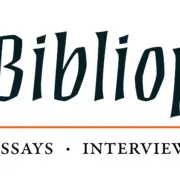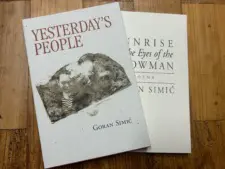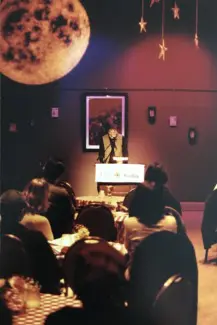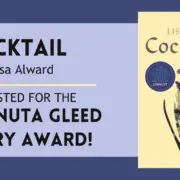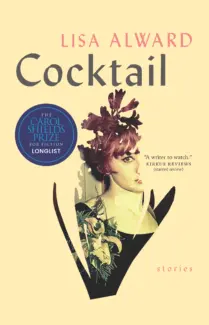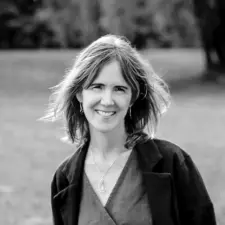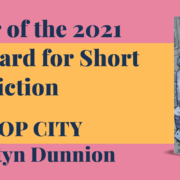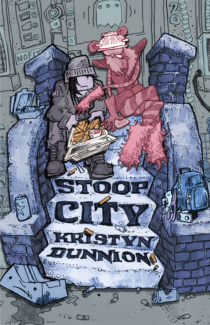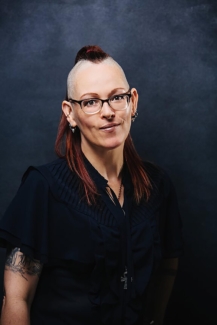The Bibliophile: Goran Simić, 1952–2024
Want to get new excerpts, musings, and more from The Bibliophile right away? Sign up for our weekly newsletter here!
***
Goran Simić: 1952–2024
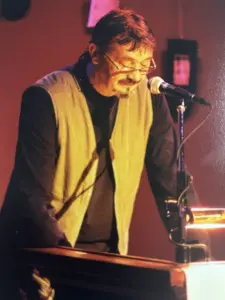
Photo: Goran Simić reading at The Windsor Festival of the Book, November 2003, the day he and publisher Dan Wells first met.
This past weekend I spent the better part of forty hours digging through old boxes dating to the earliest days of Biblioasis. A couple of archivists were coming to town on Monday and Tuesday to assess a potential acquisition and I wanted to make sure that the press archives were in presentable condition. It’s been a long-running joke at the office that I don’t recycle, I archive, which also explains the shape of some of the boxes I sorted through: photographs alongside event posters alongside production files alongside edited manuscripts and other press and literary ephemera. It made me nostalgic—which is, admittedly, not very hard to do—but this state was aggravated by the fact that in less than a week it will be the twentieth anniversary of the publication of our first book, Salvatore Ala’s Straight Razor & Other Poems. At one point we intended to mark this anniversary with some celebrations, but publishing continues to be hard, so outside of a few notes and posts in places like this, we’ll be focusing our energies on more essential things, like celebrating our authors and their books.
I got lucky early in my delvings, unearthing a range of photographs, documents, and ephemera from 2004–2006, when Biblioasis began to take shape as a press. And items even older than those. In a very real way, Biblioasis Press was conceived as a result of my work running The Windsor Festival of the Book, which began in 2002. I discovered copies of festival programs, posters, and photographs from the first couple of years, including many writers who would become central to Biblioasis as it developed: Caroline Adderson, Mark Kingwell, John Metcalf, Judith McCormack, and Leon Rooke, among others. And Goran Simić.
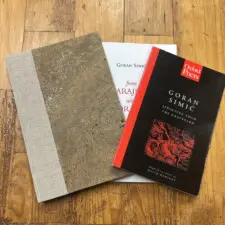
Photo: Hardcover and paperback editions of From Sarajevo, With Sorrow (Biblioasis) and Sprinting from the Graveyard (Oxford) by Goran Simić.
In my second year running the festival, we partnered with PEN Canada, who put together a panel of Paulo da Costa, Rishma Dunlop, Goran Simić, and a couple of other writers. I was determined to read at least one book by everyone who participated in our festival: Goran Simić had two titles available in English, Immigrant Blues, recently published by Brick Books, and Sprinting from the Graveyard, a gathering, by David Harsent, of English “versions” of Goran’s poetry dealing with the Serbo–Croatian war, published by Oxford but at that point already out of print. I found copies of both and read them, but it was the latter that especially quickened my pulse. Not yet knowing enough about publishing, I urged Goran to get it again into print; he drew hard on his pipe and did something with his body that, though not a shrug, made it clear that it was out of his hands. (His inscription in my copy: November, cold day 2003 / For Daniel, who surprised me with this book.) Later that evening, at the festival afterparty, I sat down with Kitty Lewis, the long-time managing editor of Brick Books, and enthused about Sprinting and how someone needed to bring it back. Between alcohol and enthusiasm I came on too strong, an occupational hazard, and at some point, exacerbated, she threw her hands above her head to be rid of me and said that if I thought it should be back in print so badly then why didn’t I do it?
That question lingered for months. The main answer was that it seemed an ultimate hubris. I wasn’t a real publisher, and certainly not the kind Goran Simić needed or should expect. We were planning a short fiction chapbook series and our first trade book, but I’d not yet even published anything. I wanted to do more, but had no way of attracting better manuscripts: the few I’d managed to solicit were terrible. So, one afternoon in the early summer of 2004, faking courage (the title of my publishing memoir), I wrote to Goran and told him that Kitty’s challenge had been weighing on me: would he let Biblioasis publish him? The answer came in the mail with not one but two manuscripts, what would become Biblioasis’s second and third trade books: the poetry collections From Sarajevo, With Sorrow, and the story collection Yesterday’s People.
It had originally been my intent to simply republish Sprinting from the Graveyard as it was, but I knew nothing of copyright then and did not know that Goran did not control these poems: they belonged to Harsent. This, in my ignorance, seemed an injustice. Further, after other conversations with Goran, I learned that he had grave misgivings about Harsent’s “versions” as a result of liberties taken with his original poems: Harsent’s were scrubbed of the raw immediacy of the war. So after discussions with his ex-wife, Amela Marin, we decided to retranslate the collection, and Amela got to work, finishing a draft later that year for a planned Spring 2005 publication. We worked on it via email through the fall, but decided to do the final editing in person.
Over this period, we published Salvatore Ala’s Straight Razor and the first volumes in the Biblioasis short fiction series, including Leon Rooke’s novella Balduchi’s Who’s Who. Goran owned a building with his new partner at 226 Carlton in Toronto’s Cabbagetown, where he had a restaurant called Octopus’ Garden (and later Fellini’s Shoe), and suggested that we launch the press there. We did so on January 29, 2005, with Sal Ala, Rishma Dunlop, Leon Rooke, and Goran. The evening was so exhilarating that I suffered an adrenaline and dopamine hit from which I’ve not yet recovered. That date might mark the moment that the press was born as more than a sideline hustle of an unpractical used book dealer. It seemed, after the struggles of attracting audiences of any size in Windsor, almost too easy. (Later experiences taught me that night was an aberration.) More than a hundred people showed up at Goran’s small bar; it was so crowded that Thomas King offered to be my bookseller for the night just to have a place to sit. The applause was loudest and longest for Goran Simić. And the next day, while Goran helped us nurse our hangovers with a bottle of cognac from behind the bar, Sal and I worked with Amela at the front table in the Octopus’ Garden to make the final edits on the book that became From Sarajevo, With Sorrow. I remember the grey January light smudging through the Victorian front window of his Carlton restaurant, the dust glinting in the dim air, like us, still a little unsettled from the previous night. By the time Sal and I packed up to head home down the 401—a trip I’ve since made hundreds of times over the last twenty years—Biblioasis’s second book was ready for the press.
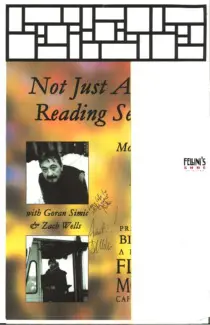
LEFT: Poster for ‘Not Just Another Reading Series…’ with Goran Simić and Zach Wells, February 13th 2006, presented by Biblioasis and the Flying Monkey Cafe & Juice Bar. RIGHT: Menu for Fellini’s Shoe.
I would work with Goran on two other books: the short story collection Yesterday’s People, published later that same year and also dealing with his war experiences, and 2010’s Sunrise in the Eyes of the Snowman, Goran’s first (and perhaps only) book written in English. His place at 226 Carton, in various incarnations, became Biblioasis’s Toronto home for launches and other events for several years, his spare bedroom often the place I laid my head. A tour this week through the internet’s scattered memory reminded me that we’d planned a selected poems, taken from his untranslated Serbian books. “I have joined the ranks,” he’d written in the introduction to From Sarajevo, With Sorrow, “of those poets who have lost their own tribal language and country, and then gone on to a place where the weight of previously published books is worth almost nothing.” It had been our hope, at the time, to change that, but the manuscript never materialized. I’ve been alerted too often of late of what we forget.
What I remember: the sharp, appealing funk of pipe and garlic; his laugh—he was always laughing—and the gravelly intonation of his English; his eyes sparking, an early warning of a gentle jibe; joking and flirting with anyone with whom he came into contact. (“X reminds me of a big hamburger.” A considered pause. “And I like hamburgers.”) Drinking cognac at Carlton into the evening as a kind of medicinal remedy as he gave me publishing advice and urged me to be more serious. I envied most of all his apparent ease in all things, especially as a person for whom nothing ever seems particularly easy.
I remember him playing soccer with my at-the-time very young son with an empty water bottle in our front yard in Windsor, the sound of glee and childish laughter as they booted around this increasingly crumpled bit of plastic, and not being sure who was laughing hardest or having more fun. I loved him for this, and even after our relationship soured and failed—two supremely impractical men increasingly alienated over necessarily practical matters—I would occasionally remember that crumpled plastic, that laughter, the sparkle, and love him again.
I thought about all this on Friday and Saturday and Sunday as I sorted through some of these earliest records. Grateful all over again for Goran, how his books and the work we did on them in 2004 and 2005 helped to give the press an initial direction and identity, and again saddened at our alienation. I thought, for the first time in many years, of reaching out to him. So when Amela’s message came via Facebook this Tuesday that he’d died on September 29, perhaps at the moment that I was sorting through the posters and restaurant menus and galleys, my sadness deepened. In place of reaching out to him, I’ve now written this.
In the introduction to From Sarajevo, With Sorrow he asks “for whom were these poems written under candlelight, between 1992 and 1995?” His answer is worth reading in full, but I’ll give another small bit of it here:
The lines I wrote were written in the belief that, when compared with the cold newspaper reports which would be forgotten with the start of a new war elsewhere, only poetry can be a true and decent witness to war. I remain uncertain whether this is because the history of horror is a bad teacher or we are bad pupils. I simply wrote what I saw. Perhaps I wrote them to explain to myself the fear in my children’s eyes when they walked along streets covered in blood. Or to comfort myself with the fact that I went to so many funerals, but nobody went to mine. New wars have indeed replaced old wars, and it’s hard to believe that ten years have passed since my own war ended, ten years since I wrote these poems as a poet, a witness, and a survivor.
And it’s hard to believe that ten years have passed since I last spoke with Goran, and that in this time where new wars have replaced old wars he isn’t here, as poet, as witness.
Facebook is a useful tool for a flagellant, but it can give some relief as well: to see Goran akilter with his pipe and his dog and his smile. It’s okay: I can still hear his laugh.
Dan Wells,
Publisher

Goran Simić crosses the Mitjacka River on a water run. Frontispiece, From Sarajevo, With Sorrow. Photo Credit: Gilles Peress.
THE FACE OF SORROW
I have seen the face of sorrow. It is the face of
the Sarajevo wind leafing through newspapers
glued to the street by a puddle of blood as I
pass with a loaf of bread under my arm.
As I run across the bridge, full water canisters
in hand, it is the face of the river carrying the
corpse of a woman on whose wrist I notice
a watch.
I saw that face again in the gesture of a hand
shoving a child’s shoe into a December furnace.
It is the face I find in inscriptions on the back of
family photographs fallen from a garbage truck.
It is the face which resists the pencil, incapable of
inventing the vocabulary of sorrow, the face with
which I wake to watch my neighbor standing
by the window, night after night, staring into
the dark.
—Goran Simić, From Saravejo, With Sorrow
***
In good publicity news:
- The Notebook by Roland Allen was reviewed in the Washington Post: “Allen’s history of the notebook both instructs and entertains.”
- May Our Joy Endure by Kev Lambert (trans. Donald Winkler) was featured in Lit Hub’s “16 Best Book Covers of September.”
- The Pages of the Sea by Anne Hawk was featured in lists from Lit Hub, Book Riot, and Daily Kos, in celebration of its Oct 1st US pub date.
- Comrade Papa by GauZ’ (trans. Frank Wynne) was reviewed in the Complete Review: “A fine, lively novel . . . very engaging, and engagingly told.”
- A Case of Matricide by Graeme Macrae Burnet was reviewed in the Herald Scotland: “A satisfying close to the saga of Georges Gorski.”

